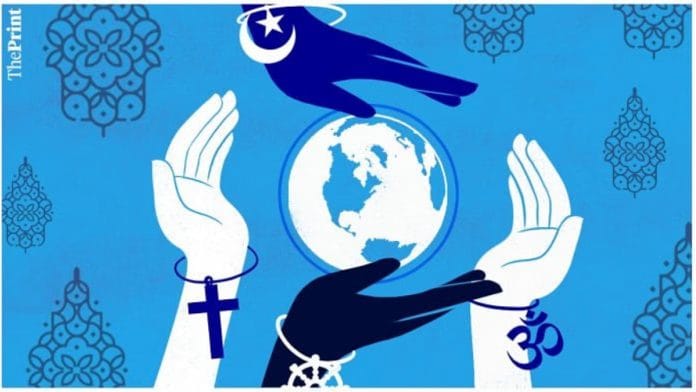Thank you dear subscribers, we are overwhelmed with your response.
Your Turn is a unique section from ThePrint featuring points of view from its subscribers. If you are a subscriber, have a point of view, please send it to us. If not, do subscribe here: https://theprint.in/subscribe/
The word Hindu is believed to have originated from the river Indus, once known as Sindhu. Several millennia ago, the Persians referred to those living east of this river as Hindus and their land as Hindustan. Over time, the collective faith, practices, and philosophies of these people came to be called Hinduism. Whether Hinduism qualifies as a “religion” in the conventional sense, however, remains a moot point.
The dictionary defines religion as “belief in God or gods and the practice of a defined set of rituals.” A broader and more inclusive definition describes religion as “a collection of cultural and belief systems that establish symbols connecting humanity to spirituality and moral values.” Religions, it says, derive morality, ethics, laws, and preferred lifestyles from ideas about the cosmos and human nature.
In essence, gods were created by man as a refuge from the unknown , an attempt to humanize or personify the forces of nature. Many of the deities worshipped in Hinduism today trace their origins to the Rig Veda. Take, for instance, the evolution of the goddess Saraswati. In the Vedic age, she was known as Vac , the goddess of speech. Over time, Vac transformed into Saraswati, the Puranic goddess of learning, wisdom, and intellect. In those days, all learning and transmission of knowledge were oral , through vac or speech , hence the association. Thus, Saraswati, the “goddess” of learning, was born.
All Hindu deities evolved similarly. They represent natural forces (such as creation, preservation, and destruction) or human aspirations (such as wealth, strength, or love). Even Dravidian deities arose from the worship of natural phenomena like the sun and wind. Over time, the Aryan and Dravidian pantheons intertwined, merging into a composite spiritual tapestry.
Hinduism , a term given by outsiders , thus encompasses far more than what the word religion implies. It did not evolve as a religion in the institutional sense; it is more accurately described as a philosophy or way of life. Unlike most organized faiths, it does not prescribe a single path, dogma, or rallying point. The so-called gods are actually deities, symbolic manifestations of deeper truths, not the Supreme Being itself.
The Upanishads speak of Advaita, the essential unity of the self and the Supreme. The concept of Aham Brahmasmi (“I am Brahman,” or simply, “I am the Supreme”) emphasizes that divinity is inherent in man. The quest, therefore, is inward. Self-realization, not ritual or prayer alone , is the key to realizing Truth. Indian philosophy teaches that man is essentially divine, and there is no single path to reach that understanding.
By contrast, the major religions of the modern world largely arose as reactions , noble in origin, seeking justice, order, or compassion , but later exploited by vested interests to dominate societies.
Religion, culture, and belief are often spoken of in the same breath, but they are not synonymous. A belief is a state of mind , an acceptance of a proposition as true, whether or not it is. A ritual is a symbolic act performed for meaning or memory. Tradition is a fusion of beliefs and rituals. Culture, on the other hand, is a set of values , and in the Indian sense, it is characterized by tolerance, accommodation, open-mindedness, and an underlying, quiet spirituality that places human welfare at its center.
This enduring culture has allowed India to remain cohesive despite its staggering diversity. Over millennia, countless peoples arrived, stayed, and contributed to a shared civilization. Yet, it is religion, in its dogmatic or politicized form, that often pulls at this delicate convergence, creating needless tension in what is otherwise a profound harmony of belief and culture.
In the end, faith was meant to liberate, not divide. True spirituality lies not in asserting one’s belief over another’s, but in realizing the unity that underlies all existence. Religion begins with belief, but wisdom begins when belief transforms into understanding. The sooner we accept that faith is a personal journey, not a competitive enterprise, the closer we come to peace, both within and without.
Col KL Viswanathan
(The author is an Indian Army veteran and a contemporary affairs commentator. The views are personal. He can be reached at kl.viswanathan@gmail.com)


